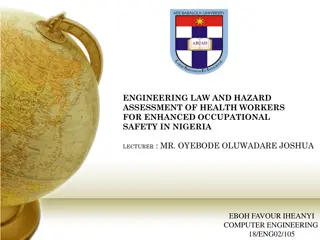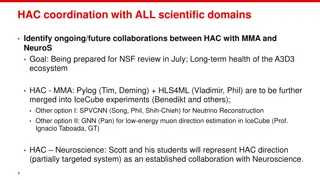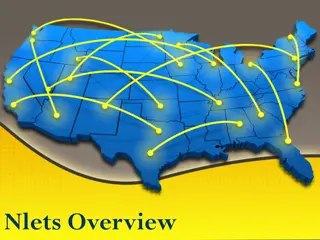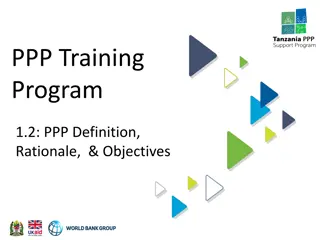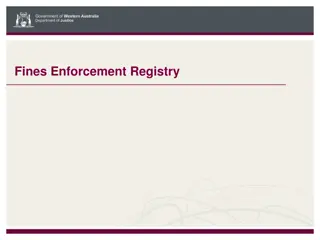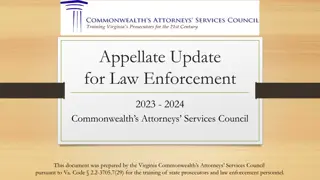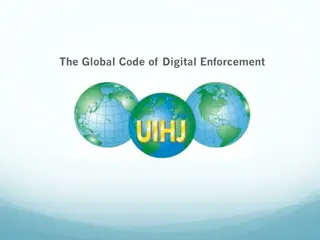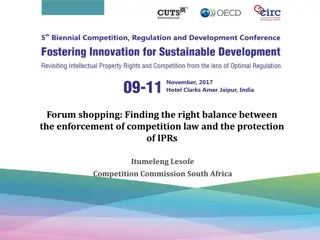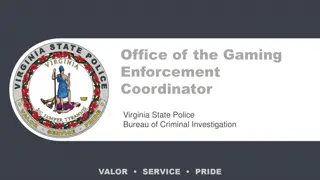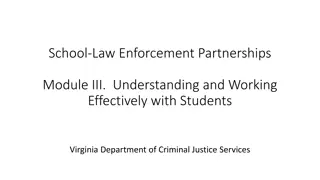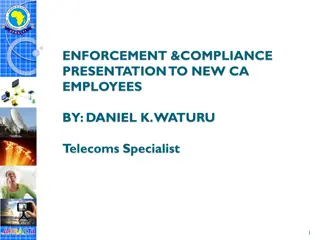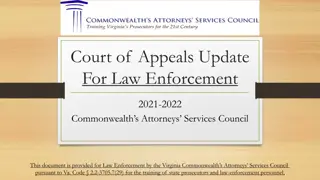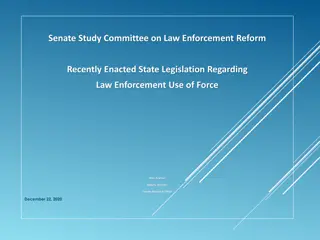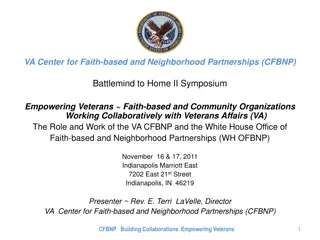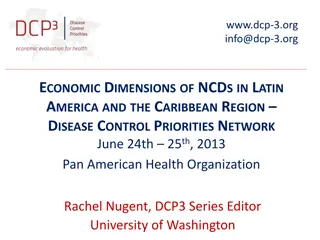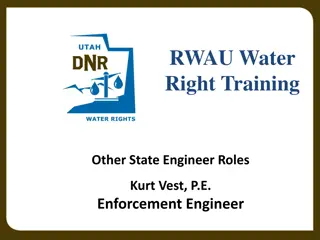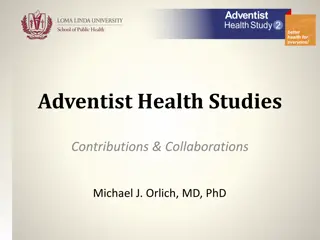Collaborations and Partnerships in Law Enforcement and Public Health in Africa
The presentation discusses the state of collaborations between law enforcement and public health sectors in Africa, focusing on issues like responding to epidemics, gender-based violence, and counter-insurgencies. Key players, challenges, and successful programs are highlighted to shed light on the dynamics of these collaborations.
Download Presentation

Please find below an Image/Link to download the presentation.
The content on the website is provided AS IS for your information and personal use only. It may not be sold, licensed, or shared on other websites without obtaining consent from the author.If you encounter any issues during the download, it is possible that the publisher has removed the file from their server.
You are allowed to download the files provided on this website for personal or commercial use, subject to the condition that they are used lawfully. All files are the property of their respective owners.
The content on the website is provided AS IS for your information and personal use only. It may not be sold, licensed, or shared on other websites without obtaining consent from the author.
E N D
Presentation Transcript
Envisaging the Future Munya Katumba Africa region
AFRICA Munyaradzi I Katumba Aidsfonds.nl SARPCCO & Police training in Southern Africa COC Netherlands.nl SOGIE & Police training in Africa 3 Annual Review September 29, 2024
About the presentation The situation regarding law enforcement and public health collaborations and partnerships in Africa Who drives/leads LEPH collaborations? Do they work together well, or are there problems? Problems and challenges Examples of programs that are working to build better collaboration
Situation of collaborations Responding to epidemics and pandemics (HIV & AIDS, STIs, COVID19) Responding to Gender-Based Violence (GBV), agenda setting & policy reviews Responding to socio-economic problems/challenges Counter-insurgencies or responses to terrorism when it happens within civilian spaces (rape, disease, death etc).
Africa Situation - LEPH collaborations and partnerships Working well Especially those with long history/experience of working together Common goal towards local, national and global health outcomes Antagonistic Civil society organisations (CSOs) puts blame on LE LE perceive CSOs as enemy of the State We are there to arrest criminals Sometimes there are no results things remain the same September 29, 2024 Review 6 Annual
Who drives/leads collaborations? Government/law enforcement Inter-govt departments collaborating (Botswana Men sector security sector on health-related projects Govt/Law Enforcement (Multi-sectoral HIV, AIDS & STIs response) Civil Society Organisations (CSOs) Human rights Key populations and violence Gender Based Violence (GBV) Abortion girls & women s rights
Who drives/leads collaborations? Regional bodies SARPCCO - Health, HIV, AIDS, STIs, TB, training programme SADC HIV and AIDS, terrorism/insurgencies response in Mozambique ECOWAS/COMESA/ECCAS - insurgencies of the LRA (Uganda); RUF (Sierra Leone), Boko Haram (Nigeria) and Al- Shabaab (Somalia) The UN family Peace keeping missions in Sudan, Eritrea, DRC, Central Republic etc Policing around vulnerable groups
Why collaborate with law enforcement about issues on sexual orientation, gender identity & expression (SOGIE)?
Arrest criminals Laws criminalising same sex relationships Everyone is equal before the law and has the right to equal protection and benefit of the law. Hate crimes committed against LGBTI+ people show extreme violence. Homophobic attacks and murder. 11 Annual Review September 29, 2024
Why collaborate with law enforcement about drug use?
Global cocaine trafficking routes Source: World Drug Report 2015 Source: World Drug Report 2015
Injection DRUG Injection DRUG USE USE DIRECT RISK INDIRECT RISK High risk sexual practices Low levels of knowledge Limited access to appropriate services Violence Stigma, discrimination & exclusion Needle & syringe re-use Ineffective cleaning Sharing HIV Infection HIV Infection Source: TB HIV Care Association 14
Why speak to law enforcement about sex work?
Criminalisation & health Illegal behaviours & limited understanding of lived experience Community pressure, illegal activity, arrest quotas Moral judgment, criminalisation, discrimination, vulnerability Entry into criminal justice system Health risks, criminal record, exposure to organised crime, decreased likelihood of recovery , cost
Sex work in Southern Africa Criminalised with limited legal recourse Rights violations Unsafe working conditions Violence & rape common High risk for HIV infection & transmission Unresponsive health system Limited coverage of health services Limited prevention commodities Discrimination by health workers Unfavourable conditions for good health outcomes Challenging relationship with law enforcement: Engage in illegal activity Extortion and bribery by law enforcement officers Confiscation of condoms by law enforcement officers Violence & rape by law enforcement officers
Summary Problems/Challenges Laws criminalising same sex relationships, sex work and drug use CSOs and CBOs perceived by LE as enemies of the state (promoting immoral behaviours or the Western agenda) Backlash (Global North/donors) LE being rigid, bureaucratic, protocol-driven, lengthy processes Lack of financial and human resources to maintain collaborations Incremental use of force as a complement to peaceful negotiations (LE accountability to themselves and security sector).
Why CSO collaborate and develop partnerships with LE? Benefit for LE Mechanism Improved employee wellness Improved strategies to respond appropriately to sexuality, drug use and gender-based violence Reduction in HIV infections among law enforcement officers Training includes overview of HIV risks (violence, safer sex, preventing sharp object injuries etc.) and prevention and treatment methods Reduction in civil complaints and lawsuits against law enforcement Improved skills to manage challenging situations (verbal abuse, intoxication, engaging with gender non-confirming people, managing withdrawal, overdose etc.) Reduction in deaths within police custody Increased knowledge around drug use and health issues, and benefits for increasing access to health services while in custody Improved quality of law enforcement services Deepen understanding of sex work, drug use, abortion, sexuality and rights and how these link to everyday police work. Provision of practical skills for addressing gender- based violence and empowering victims. Improved relationships with community Improved understanding of rights and of ways to respect all people, and to work towards improving community health and safety Adaptation to changing legal environment Knowledge and skills around hate crimes legislation (pending), and awareness of efforts around sex work decriminalisation Networking and capacity building Linkages with Dutch Police, LEPH conference, exchange visits to Netherlands PinknBlue, more planned within the SARPCCO region
Working to build better collaboration Examples of collaborations within Africa ID Country Name of programme Theme Programme description 1 South Africa, Durban Advocating for inclusive services for drug users Harm reduction Police as advocates for harm reduction during COVID-19 Lockdown in Durban: Shifting the dominant narrative. 2 Mozambique, 11 provinces Hands Off! programme Turning Mozambique police into an ally Violence, GBV In Mozambique, law enforcement officers were one of the major perpetrators of violence against sex workers. After years of lobby, Pathfinder, an international NGO, and sex worker-led network Tiyane Vavasate got sex workers and police officers to directly work together. As a result, sex workers in Mozambique have gained a voice in dealing with the police, police have turned from perpetrator to allies and violence is being tackled effectively. 3 Kenya Journal article with overview of how police discrimination & stigma leads to delayed seeking healthcare by sex workers Stigma & discrimination Research project that estimate levels of discrimination, violence, and stigma against women sex workers by police in Kenya. Further estimates the association between manifestations of police discrimination and stigma, and sex workers general health care utilization and consistent condom use as a result. 4 Kenya, Kisumu Keeping Alive Societies Hope (KASH) - From Abuse to Protection: Building Understanding Between Police Officers and Sex Workers Gender, violence, Sexual orientation and gender identity & expression Police sensitisation on human rights of marginalised groups (SW & MSM) 5 Liberia & Sierra Leone LEGAL & SoSNoL - Mapping and educating police officers on human rights for all, and the COVID-19 Emergence response Gender/violence, SOGIE, COVID- 19 Educating police officers on human rights and raising awareness on COVID-19 among police officers as an emergence response 6 Ghana, Nigeria, Uganda & Zambia Ipas - Police as partners in improving abortion access Gender/Abortion Training police to be allies in advocating and helping rather than hinder women s access to abortion care. Training of police officers on the abortion law and the right of women to access services. 7 South Africa South African Police Service (SAPS) Dignity, Diversity and Policing programme Violence, SOGIE, Gender Training South African police to in cooperate human rights principles relating to drug use, violence, gender identity, expression and sexual orientation.
Working to build better collaboration 8 Zimbabwe Space for Marginalised Groups in Diversity Zimbabwe Trust's sensitisation of police officers in Masvingo Zimbabwe Violence, Gender, sex work In 2020 during first phase of the COVID19 lockdown, 30 sex workers were chased away from the compound they lived for over 30years. The Zimbabwe Republic Police (ZRP) Dispol Masvingo Central appreciated the dialogue and admitted they needed sensitisation on the subject matter. Since then SW were allocated a slot in the ZRP quarterly meetings to provide sensitisation talks on issues relating to sex work and marginalised groups. Court lenience has also been observed were they have reduced restrictions and allowed sex workers and other minority groups to access courts with the GBV survivors. Case handling has also improved because of a proper case tracking and tracing. 9 Zimbabwe Provision of clinical services by Zimbabwe Republic Police at government hospitals and clinics during COVID lockdown COVID19 During the COVID19 lockdowns in 2020 to 2021 the Zimbabwe law enforcement agencies including the ZRP were engaged in providing clinical services at general hospitals and clinics. The health care workers from the security sector were deployed to provide such a service. Apart from being known for unlawful arrests, violence and human rights violations the ZRP did a good job in offering such a service to the general public. 10 Africa (Somalia, Sudan, Eritrea, Central African Republic, Western Sahara, Democratic Republic of Congo, Mali) The Development of Peace Operations in Africa, and its Police Components Gender, conflict, violence, sexual abuse Police, over the past 20 years have been involved in several initiatives to support African multidimensional peace operations (POs). In African, the rule of law (RoL) is a critical challenge for most countries emerging from conflicts. Police have assisted in the development of RoL frameworks in countries emerging from conflict. Police collaborated and engaged with military and civilian components in developing strategies towards strengthening RoL. The police peace building missions and operations cover developing national police capacity within the host country; supporting protection of civilians under imminent threat; assisting security sector reform; supporting the disarmament, demobilisation and reintegration of ex-combatants. Addressing issues of sexual abuse, sexual and gender-based violence and violence against children and vulnerable persons has also been key as part of critical components of a stable and secure state.





